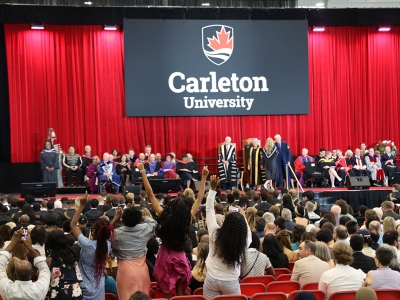Team Ontario, a collaboration of Carleton, Queen’s University and Algonquin College students, won first place in the coveted Engineering category at the 2013 Solar Decathlon Competition in Irvine, California.
In total, the team received four awards:First place in Engineering, Energy Balance (tie), Hot Water (tie), and second place in Affordability. They also placed fourth in Market Appeal. The final ranking for the team was sixth place overall.
“Team Ontario revealed a complete understanding of building science, a very good building envelope for the target climate, and excellent integration of passive and active strategies,” said Engineering Contest juror Kent W. Peterson of P2S Engineering. “We believe this team best demonstrated design excellence with optimal energy production and maximum efficiency.”
Nineteen teams from around the world, including competition winner Vienna University of Technology, Stanford University, and Czech Technical University, made the cut to compete in the 10-day competition.
“Having started this project over three years ago and having the opportunity to work with such amazing and dedicated Carleton students has been nothing short of exceptional and inspiring. We set out a goal to put Carleton Engineering on the international stage and today we accomplished this by winning the most coveted prize at the competition,” says Cynthia Cruickshank, Carleton’s faculty lead and professor in the Department of Mechanical and Aerospace Engineering.
The Solar Decathlon challenged 19 collegiate teams from around the world to design, build and operate solar-powered houses that are cost-effective, energy-efficient and attractive. Only two Canadian teams competed. The main purpose of the competition is to demonstrate that net-zero, solar homes are feasible, affordable and desirable while also developing the next generation of building professionals.
The 940 square foot, $300,000 home features a master bedroom, one bathroom, a multipurpose room that can be used as an office or second bedroom, and a combined kitchen/living room/dining room. Designed to be ‘net zero’, the home will utilize various solar and energy efficient technologies to produce at least as much energy in a year as it will consume. Students began designing the building in the summer of 2011 by brainstorming its architectural appearance, running simulations and performing structural analysis. Construction began in September 2012 at Algonquin College’s campus in Perth, Ontario, where the students were able to complete most of the main structure and conduct a test move. In May of 2013, it was relocated to Algonquin College’s Ottawa campus for completion.
Carleton donors helped make the project a reality too–gifts made through futurefunder.ca to the project helped keep student researchers working on the project throughout the summer.
All scores, pictures, videos and media releases from the Solar Decathlon 2013 competition will be posted at solardecathlon.gov



